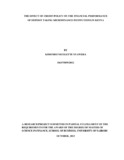| dc.contributor.author | Kimondo, Nicolette N | |
| dc.date.accessioned | 2013-11-14T04:40:38Z | |
| dc.date.available | 2013-11-14T04:40:38Z | |
| dc.date.issued | 2013 | |
| dc.identifier.citation | Degree of Master of Science in Finance | en |
| dc.identifier.uri | http://erepository.uonbi.ac.ke:8080/xmlui/handle/123456789/58979 | |
| dc.description | A research project submitted in partial fulfillment of the
requirements for the award of the degree of master of
science in finance, school of business, university of Nairobi | en |
| dc.description.abstract | This study was carried out with the purpose of establishing the effects of credit policies on
the financial performance of Micro finance institutions.According to Hartarska (2005)
microfinance is the provision of small scale financial services to low income or unbanked
people while a credit policy isan institutional method for analyzing credit requests and its
decision criteria for accepting or rejecting applications (Girm` 1996).MFIs in Kenya are
classified and registered into three different tiers: deposit-taking institutions such as
banks, credit only non deposit taking institutions, and informal organizations supervised
by an external agency other than the government. This study concentrated on the deposit
taking micro finance organizations. The
Objective of the study was to find out the effects of credit policy on financial performance of
deposit taking micro finance organizations. A lot of DTM’s business evolves around the
credit part and this study is to help us understand the role played by the credit policy on
financial performance. The researcher used a census approach for the six deposits taking
micro finance organizations in Kenya to get the data required. The main way of getting
information was through secondary data from the central bank of Kenya and the individual
institutions. The findings indicated a positive significant relationship (r = 0.199) implying
that credit policies affects the financial performance of deposit taking micro finance
organization with a minimal effect since there other more factors that affect financial
performance with a greater effect. The results of the regression analysis indicate that the
dependent variables are both individually and jointly significant and have an effect on
financial performance. From the values of the coefficients we discern that the
independent variables are correlated to the dependent variable. The results indicated that
credit standard policy significantly affects credit financial performance (â=47.9, pvalue=
0.48), credit terms by (â=-86.5, p-value=0.123) and collection effort by (â=-129.5,
p-value=0.383). In conclusion, the study established that the three independent variables
significantly affect financial performance. From the study, it is recommended that deposit
taking micro finance organizations should not concentrate so much on the credit policy
but also other factors since even though credit policies affect DTM’s financial
performance. | en |
| dc.language.iso | en | en |
| dc.publisher | University of Nairobi | en |
| dc.title | The Effect of Credit Policy on the Financial Performance of Deposit Taking Microfinance Institutions in Kenya | en |
| dc.type | Thesis | en |
| local.publisher | School of Business | en |

